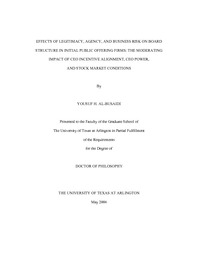| dc.description.abstract | Board structure is generally seen as a means for acquiring resources, monitoring managerial behaviors, and enhancing firm legitimacy. Further, it is believed that the capacity of the board of directors to accomplish the above would improve with increasing outsider ratio, separation of CEO/chairman positions, and increasing board size. Previous studies found that an independent board plays an essential role in the long-term success of the firm. The role of the board is even more crucial during the firm's transformation from a privately held to a public company (i.e., Initial Pubic Offering).
This study investigated the influence of IPO firms' risk on the structure of the board of directors by: (1) going beyond the agency paradigm and using Investor Confidence and Substitution Effects perspectives; (2) considering the many different kinds of risks (i.e., legitimacy, business, and agency risks) that are unique to IPO firms; and (3) exploring how CEO incentive alignment, CEO power, and stock market conditions moderate the relationship between risk and board structure.
A sample of 410 domestic firms that made initial public offerings in the years 1997, 1998, 2001 and 2002 on the U.S. stock exchanges was collected. Results indicate significant negative relationship between the number of outside directors in the board of directors, on one hand, and firm age and the TMT equity ownership, on the other. The level of VC involvement was found to have significant negative relationship with separation of CEO/chairman positions. Finally, results suggest that board size is influenced positively by number of risk factors and negatively by blockholder equity and TMT equity.
In addition, results suggest that the level and the direction of the influence of the independent variables are determined by the level of CEO stock options, the amount of CEO power at the time of IPO, and stock market conditions. More specifically, the increase in CEO stock option was found to reduce the impact of risk on the dependent variables. In addition, this study found that CEOs use their power and influence on the IPO firms to curb investors' pressure for increasing board independence. Finally, going public during hot markets was found to weaken the impact of risk on board independence. | en_US |

